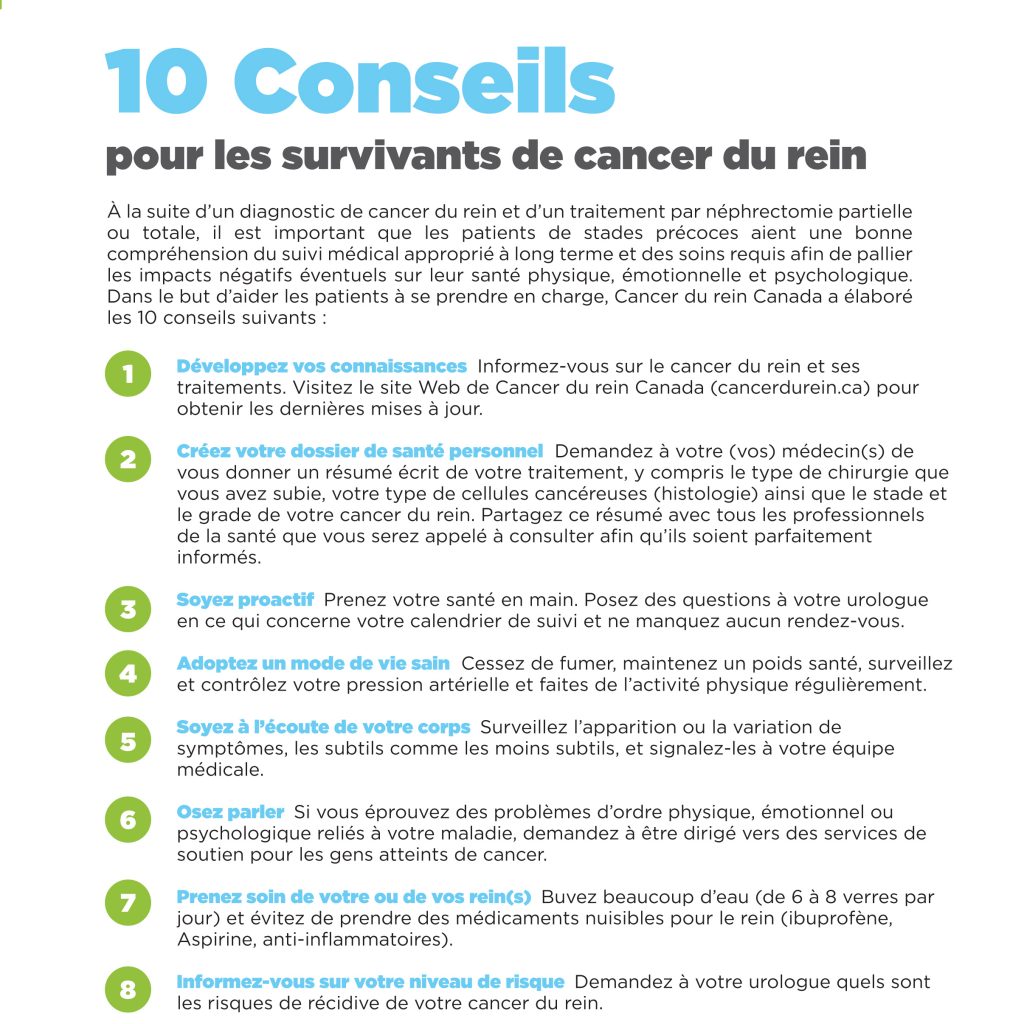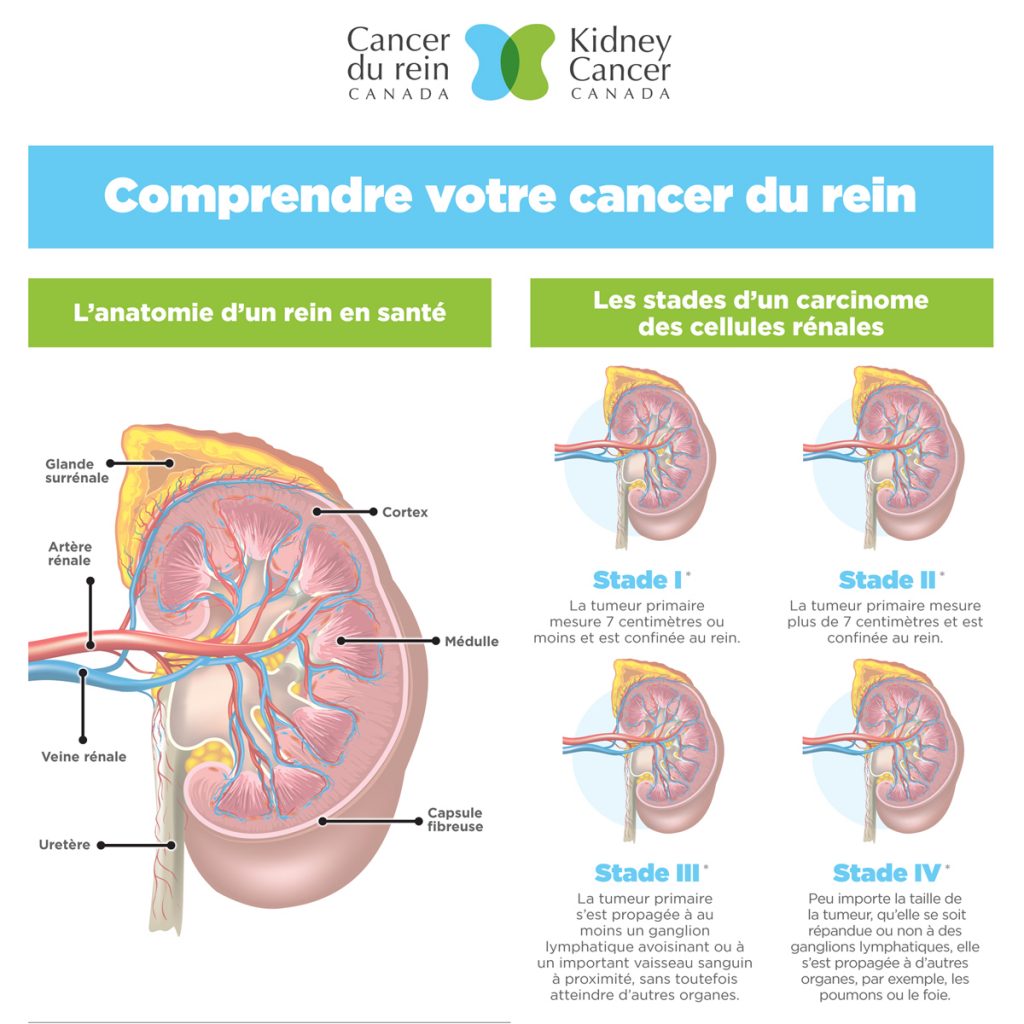Our immune system is able to recognize cancer cells as abnormal and is sometimes able to mount an effective response against the cancer. In very rare cases of kidney cancer, this can lead to a spontaneous remission, a cure of the cancer. The goal of immuno-oncology therapy is to better recognize cancer cells and strengthen and support the body’s immune system to fight against the cancer.
There are many kinds of immuno-oncology therapies available (and being tested) for many types of cancer, including kidney cancer. Each type of immuno-oncology therapy listed below activates your immune system to fight your cancer in slightly different ways.

Types of checkpoint inhibitors
Checkpoint antibodies are immuno-oncology therapies that work by lifting the last line of defence that kidney cancer cells use to avoid or “hide themselves” from the immune system. Immune cells are controlled by a group of checkpoints, which very finely balance the immune system. Too little regulation and the immune system becomes overactive and attacks the body; too much and immune functions are impaired and infections and cancers can establish themselves.
Sometimes cancer cells get sneaky and use this system and checkpoints to stop your immune system from recognizing cancer cells. Checkpoint inhibitors are drugs that block these checkpoints so that the immune system is freed up to fight cancer cells.
Checkpoint immune therapy does not seem to help unless the immune system is already targeted, alerted, activated and attempting to get into the cancer cells, so unfortunately, these drugs don’t work for all kidney cancers. Researchers are still learning who will and who won’t benefit, but it does seem that if there are no immune cells inside the tumour, then the checkpoint antibodies may not work.
PD-1 AND PD-L1 INHIBITORS
A protein called PD-1 (stands for programmed cell death 1) is present on the surface of immune system cells and its partner PD-L1 is present on the surface of other cells in the body. PD-L1 on tumour cells allows them to stop the immune system from attacking them. If these two proteins bind, the immune cellthinks the other cell is healthy and moves on. This is like a secret handshake so your immune system cells and healthy cells know that they are both on the same team. Tumour cells can trick the immune system into thinking that they are healthy cells by placing PD-L1 proteins on their surface: the cancer cell then learns the secret handshake.
PD-1 and PD-L1 inhibitors work by preventing PD-1 and PDL-1 from binding. This stops the cancer cell from being able to trick the immune system.
Examples of PD1 and PD-L1 inhibitor drugs are:
- nivolumab (Opdivo®) – nivolumab is a PD-1 drug approved for treating kidney cancer in Canada as a second-line therapy for metastatic clear cell renal cell cancer.
- pembrolizumab (MK-3475, lambrolizumab, Keytruda®)
- atezolizumab (MPDL3280A,Tecentriq®)
- durvalumab (MEDI4736)
- avelumab (MSB0010718C)
CTLA-4 INHIBITORS
Another type of antibody works by blocking the CTLA-4 checkpoint protein (stands for cytokine leukocyte antigen 4). CTLA-4 is another kind of checkpoint, but is not on tumour cells, rather it is on other immune cells. CTLA-4 stops the immune system from making too many tumour-fighting cells (the killer T-cells), so blocking or stopping CTLA-4 makes the immune system able to recognize and fight tumour cells.
Examples of CTLA-4 inhibitor drugs:
- ipilimumab (Yervoy®) – is approved for treating kidney cancer in Canada as first-line therapy in combination with nivolumab for metastatic clear cell renal cell cancer
- tremelimumab (CP-675,206)
Cytokines are immune hormones that are made naturally in the body. They help activate or “turn on” the immune cells. The immune system communicates to cells in the body through certain hormones (such as interleukin and interferon). Interleukin-2 (IL-2) and interferon alfa (IFN-a) are cytokine drugs that have been used in certain people to treat some kinds of cancer, including advanced kidney cancer. Some people who were given these types of immuno-oncology therapy responded very well to the treatment. Some even had a good response, their cancer went away completely and they lived a long time after treatment. However, these immune hormones can have bad side effects and only young, physically fit people can take them, but they need close monitoring.
These drugs are not used much anymore in Canada, or are only used in certain cases.
Vaccines have been tested in many types of cancer, but older vaccines have not been effective in treating cancer to date. Clinical trials are testing new types of vaccines to treat kidney cancer. This is different than other vaccines that are now used to prevent the viruses that cause specific cancers (such as hepatitis B and the human papilloma virus or HPV).
Newer vaccines try to get your own immune system to attack cancer cells in your body, by helping the immune system identify the cancer cells as a target. Cancer vaccines are given only after you have developed kidney cancer, so these vaccines are considered a treatment and are not used for prevention. Sometimes your own immune cells or cancer cells are removed and used to make the vaccine. Then the modified cells are injected into you and help your our immune system recognize and fight the cancer cells.
SOME VACCINES BEING STUDIED IN KIDNEY CANCER INCLUDE:
AGS-003
Samples of your immune cells are collected and then genetically modified so that they recognize your tumour cells. Your modified immune cells are injected back into you. This is similar to chimeric antigen receptor or CAR therapy (see Immune cell therapy below), except that in this case the injected cells do not fight the tumour, but instead teach your immune system to fight it.
IMA901
This vaccine contains 10 common kidney cancer proteins. It works in a similar way to a normal vaccine, so it will not make you ill, but it is designed to teach your immune system how to recognize your tumour cells.
MGN1601
This vaccine contains someone else’s kidney cancer cells. When you are injected with the vaccine, your immune system will destroy these cells because they do not belong to you and will be recognized as a threat. While your immune system is fighting these foreign kidney cancer cells, it will also learn what a kidney cancer cell looks like and will therefore be able to destroy your tumour.
Vaccine therapy is still experimental for kidney cancer.
A cancer patient’s own immune cells (their lymphocytes) can be removed or harvested from their body, either from their blood or their kidney tumour, are grown in a lab, then are injected back into the patient. By making more immune cells, if the number of immune cells can outnumber the tumour cells, it is hoped that this will lead to an attack on the kidney cancer. These include tumour infiltrating lymphocytes (TILs) and chimeric antigen receptor (CAR) T-cell therapy. These types of therapies are currently only being used in clinical trials for some types of cancer, but are only available in a few major research institutions worldwide.
Of Note:
Immuno-oncology treatments for kidney cancer are being tested widely in clinical trials, both alone and in combination with targeted therapies or with other immuno-oncology treatments, because researchers do not yet know what the best options might be for treating kidney cancer. Access to these trials and treatments may depend on where you live in Canada. Please call us if you need specific information.
(The content on this page is an adaptation from the 10-FOR-I.O. website)
SECTION REFERENCES:
10-FOR-I.O.:
Canadian Cancer Society:
North SA, Bassapa N, Basiuk J, et al. Management of advanced kidney cancer: Canadian Kidney Cancer Forum Consensus Update. Canadian Urological Association Journal. 2015; 9(5-6):164-70.
Lee-Ying R, Lester R, Heng D. Current management and future perspectives of metastatic renal cell carcinoma. International Journal of Urology. September 2014; 21(9):847-55.
Rachna R, Vaena D. Immunotherapy in Metastatic Renal Cell Carcinoma: A Comprehensive Review, BioMed Research International. 2015. Article ID 367354.
Godwin JL, Zibelman M, Plimack ER, Geynisman DM. Immune checkpoint blockade as a novel immunotherapeutic strategy for renal cell carcinoma: a review of clinical trials. Discovery Medicine. 2014 Dec;18(101):341-50.
Motzer RJ, Escudier B, McDermott DF, et al. Nivolumab versus Everolimus in Advanced Renal-Cell Carcinoma. New England Journal of Medicine. 2015 November 5; 373(19): 1803–1813.
Updated August 19, 2016



























































